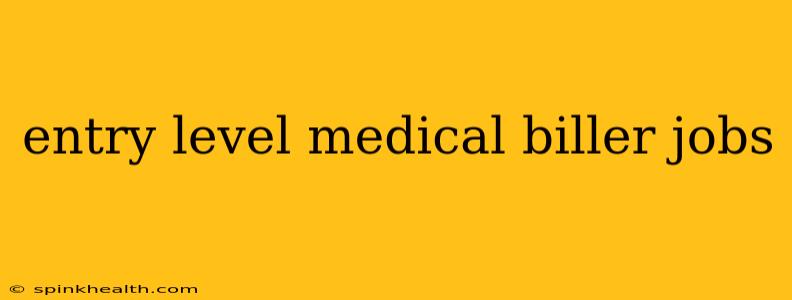Cracking the Code: Your Guide to Landing an Entry-Level Medical Billing Job
The world of healthcare is vast, and behind every doctor's visit and procedure lies a crucial, often unseen, element: medical billing. If you're intrigued by the intricate dance of healthcare administration and the satisfaction of ensuring providers get paid fairly, an entry-level medical billing job might be your perfect fit. But where do you start? This guide will navigate you through the process, answering your burning questions and setting you on the path to a fulfilling career.
Imagine this: Sarah, fresh out of college with a keen eye for detail and a passion for organization, stumbled upon the world of medical billing. Initially intimidated by the complex codes and regulations, she quickly discovered a knack for it. Now, she's a valued member of a bustling clinic, playing a vital role in the smooth functioning of the healthcare system. Sarah's story is possible, and yours can be too.
What are the typical duties of an entry-level medical biller?
At the entry level, your responsibilities will likely focus on the foundational aspects of medical billing. You'll be learning the ropes, developing crucial skills, and gaining invaluable experience. Expect to spend your days handling tasks like:
- Data Entry: Accurately inputting patient information, procedure codes (CPT codes), and diagnosis codes (ICD codes) into billing software. Think of it as the backbone of the process – precision is paramount.
- Claims Submission: Preparing and submitting insurance claims electronically or via mail. This involves ensuring each claim is complete, accurate, and adheres to payer guidelines.
- Claims Follow-up: Tracking submitted claims, identifying and resolving rejected claims, and communicating with insurance companies to facilitate timely payment. Think detective work, tracking down the reasons for delays.
- Maintaining Patient Records: Organizing and updating patient files, ensuring all necessary documentation is readily available. This is key for efficient billing and compliance.
- Assisting Senior Billers: Providing support to more experienced team members, learning from their expertise, and contributing to the overall efficiency of the billing department.
What skills are necessary for an entry-level medical billing job?
While formal education can be beneficial, many entry-level positions prioritize essential skills over extensive experience. These include:
- Strong Attention to Detail: Accuracy is king in medical billing. One wrong number can delay payment or even lead to legal complications.
- Proficiency in Computer Software: Medical billing relies heavily on specialized software. Familiarity with Microsoft Office Suite and an aptitude for learning new software are crucial.
- Excellent Organizational Skills: Managing multiple claims, patient files, and communication channels requires exceptional organizational skills.
- Effective Communication: Interacting with patients, insurance companies, and colleagues demands clear and professional communication.
- Understanding of Medical Terminology: While not required initially, a basic grasp of medical terms will significantly enhance your efficiency and understanding.
What education or certifications are helpful for medical billing jobs?
While not always mandatory for entry-level positions, relevant education and certifications significantly boost your chances. These include:
- High School Diploma or GED: This is the minimum requirement for most entry-level positions.
- Associate's or Bachelor's Degree (Optional): While not always necessary, a degree in healthcare administration or a related field can provide a competitive edge.
- Certified Professional Coder (CPC) or other relevant certifications: These credentials demonstrate competency and professionalism, making you a more attractive candidate.
How can I find entry-level medical billing jobs?
The job hunt might feel daunting, but with a strategic approach, you can increase your chances of success:
- Online Job Boards: Explore popular job sites like Indeed, LinkedIn, and Monster, focusing your searches on "medical biller," "entry-level medical billing," or "medical billing clerk."
- Company Websites: Directly visit the websites of hospitals, clinics, physician practices, and billing companies to check for open positions.
- Networking: Attend industry events, connect with professionals on LinkedIn, and leverage your personal network to discover hidden opportunities.
What is the salary range for entry-level medical billing positions?
Salary varies based on location, experience, and employer. However, you can generally expect a competitive starting salary, with potential for growth as you gain experience and certifications. Researching salary ranges in your specific area will provide a clearer picture.
Sarah's journey proves that a career in medical billing can be both rewarding and challenging. With dedication, the right skills, and a proactive approach to your job search, you too can unlock the doors to a successful career in this essential field. So, take the leap – your future in healthcare awaits!

